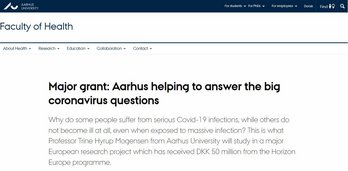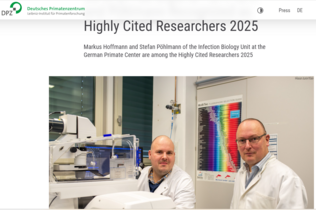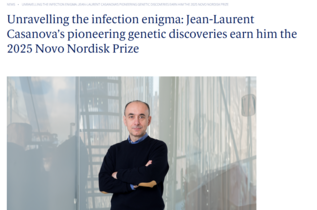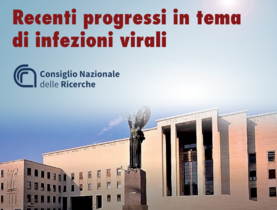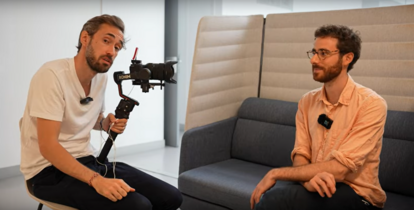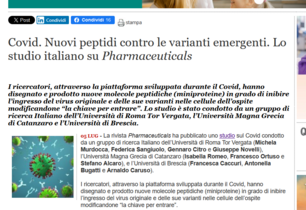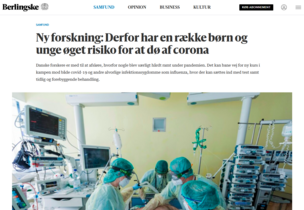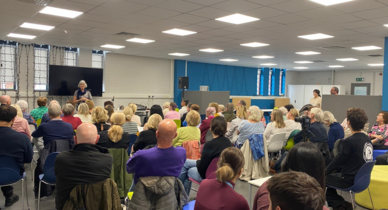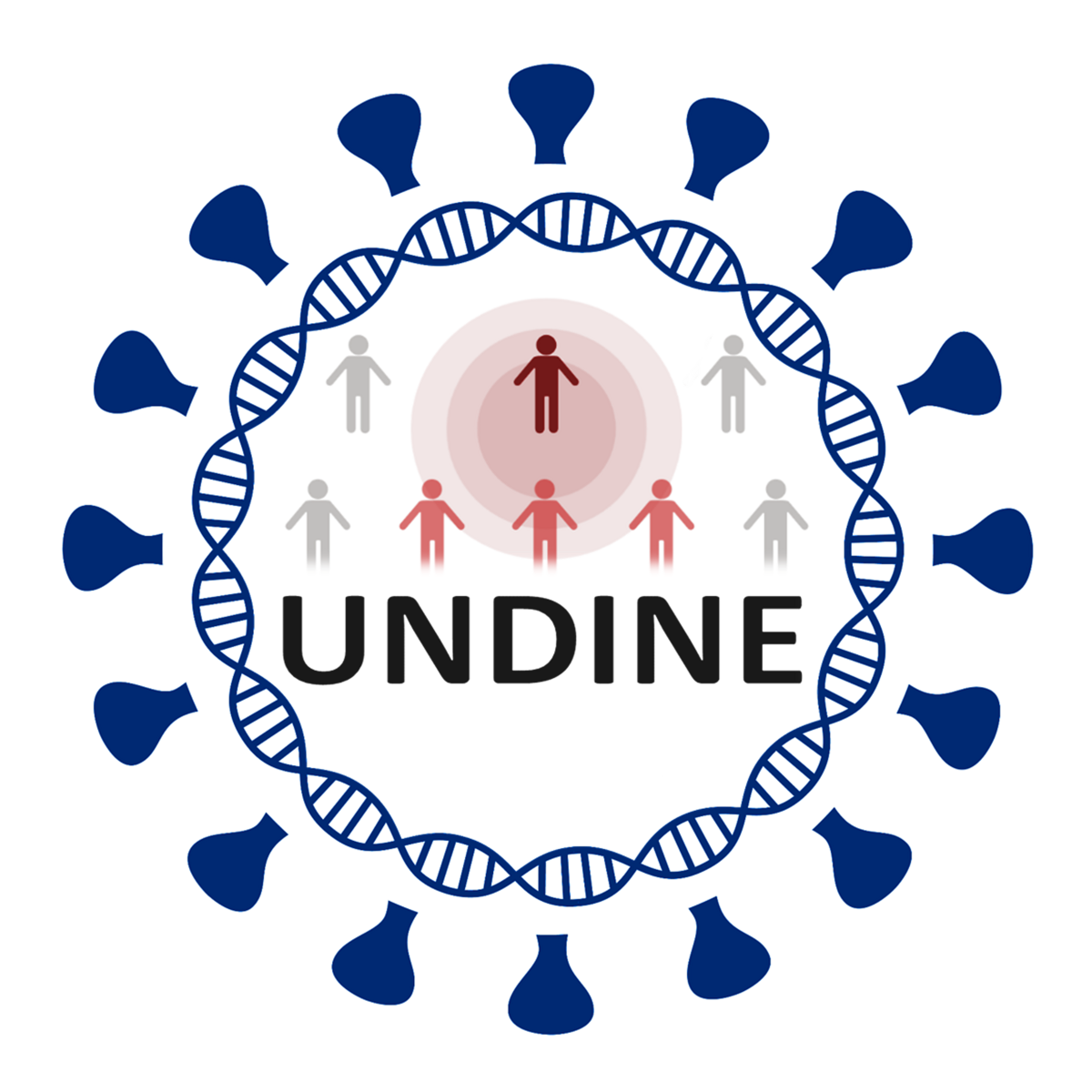Outreach activities
The UNDINE project follows a "bed side to bench" and "bench to bed side" approach and hence aims to meet a broad audience interested in its research outcome. We advertise and link all outreach to the scientific community, the pharmaceutical industry, health care providers, students, patients, and of course the general public.
Corona virus experts at DPZ honoured as „Highly Cited Researchers 2025“ by Clarivate
November 2025: Stefan Pöhlmann (DPZ) and Markus Hoffmann of the Infection Biology Unit at the German Primate Center are among the Highly Cited Researchers 2025 at Clarivate. Studying coronaviruses both have been recognised to making important contributions to the COVID-19 field. For example, they have elucidated how SARS-CoV-2 enters lung cells and showed that hydroxychloroquine does not block lung cell entry. They further demonstrated that the Omicron variant shows marked resistance to neutralizing antibodies and that recently circulating SARS-CoV-2 variants can reacquire virulence factors known from early-pandemic strains. Their research generally focuses on the transmissibility of the newly emerging SARS-CoV-2 variants and their coverage by adapted vaccines (cf. work package 2).
Presentation at the HGM 2025
At the Human Genome Meeting (HGM) in Durban / South Africa, April 11th-14th 2025, Prof Giuseppe Novelli (UNITOV) gave an oral presentation with the title: Modelling severe Covid-19 in TLR3-mutated hiPSCS-derived lung-organoids (part of UNDINE's work package 4). This meeting is organised by HUGO, the Human Genome Organisation, and brings together renowned geneticists, clinicians, and doctors along with promising early-career professionals. The program comprises a three-day main conference, along with a dedicated ‘Trainee Symposium Day’ for students/post-docs and early-career researchers and aims to stimulate fruitful discussions and to promote the exchange of data and ideas amongst global experts.

Award of the 2025 Novo Nordisk Prize
Professor Jean-Laurent Casanova (INSERM) has been awarded with the 2025 Novo Nordisk Prize! For decades, scientists believed that infections were determined solely by viruses and bacteria. But his groundbreaking research has revealed a more complex reality: genes play a fundamental role in determining who gets seriously ill and who stays healthy. This discovery has become the pivotal point of all investigations conducted in the UNDINE-project and in work package 4 in particular. We congratulate Jean-Laurent to this outstanding achievement!
Presentation at the "Workshop della Sapienza"
At the "Workshop della Spienza" in Rome on November 25th-26th, 2024, Giuseppe Novelli (UNITOV) presented a talk on the impact of host genetics on the susceptibility to infectious diseases. The workshop was organised by the Italian National Research Council (CNR) This topic is the centre of the UNDINE project and particularly relates to the work of the Novelli-lab in work package 4.
Demystifying Long-Covid - International Conference 2024
The group of Javier Martinez Picado (ICS) presented a talk at an international conference on Long-Covid in Barcelona/Spain on November 21st-22nd, 2024. This conference aimed to raise awareness, clarify misconceptions, promote understanding, and stimulate discussion amongst healthcare professionals, investigators, policymakers, and community representatives to address public health challenges related to Long-Covid. The given presentation of the Picado-lab in particular highlighted the importance of identifying biomarkers as a basis for diagnosing and treating Long-Covid in patients, since clinical manifestations continue to be diverse and not well defined. This topic is a major focus of the UNDINE project and the centre of work package 7.
Youtube-video on the research at the Institute Imagine (France)
Paul Bastard (INSERM), was interviewed in this 20min video, where he introduced his virology research. The viewer gets a look behind the scenes and discovers what the job is like to be both, a doctor and a researcher, specialized in immune diseases in children. The interviewer followed Paul during his working routine at the Imagine Institute, a research center for genetic diseases.
EU Researchers Night / Trinity College Dublin
On September 29th, 2024 Professor Cliona O’Farrelly gave a talk to the local community and informed about the viral immunity resrach at Trinity College Dublin. This was again part of the Trinity College contribution to the EU researchers’ night. Professor O’Farrelly spoke about how we can strengthen our immune systems and gave some of the guest a tour through the research facilities.
Article in Quotidiano Sanità (Italian health communication journal)
On July 5th, 2024 Professor Giuseppe Novelli reported in an article for the Italian health communication journal "Quotidiano Sanità" about his lab's recent publication. In this article, authors of the mentioned publication report on the impact of their results on the develeopment of antiviral drugs in response to newly emerging variants of SARS CoV-2. In essence, the publication of interest proposes and discusses an effective peptide-based strategy for promptly responding to new SARS-CoV-2 variants of concern. Prof Novelli has furter advertised the new publication as part of the UNDINE-project on his linkedin-profile.
Presentation at the HGM 2024
At the Human Genome Meeting (HGM) in Rome in April 2024, the lab of Giuseppe Novelli (UNITOV) presented a poster highlighting their progress in their quest to explain the genetic basis for an association between the highly variable antibody production in SARS-CoV-2 infection and the according severity of Covid-19. (UNDINE-project: work package 4). The title of the poster was: Genetic diversity of the Ig Heavy chain locus in SARS-CoV-2 infection

Article in Berlingske (Danish newspaper)
On November 17th, 2023 Professor Trine Mogensen reported in an article for the Danish newspaper 'Berlingske' about the importance of the current COVID-19 research, highlighting the focus on the immense differences in individual suceptibilities to the disease. Prof. Mogensen emphasises the importance of seeking an understanding of the risk factors that predict a severe progression of an infection. In this article, she reports on her involvement in ongoing research (incl. UNDINE) that already has identificied a number of rare genetic defects that may explain an increased suceptibility, even in young people and children. Although the corona virus is not perceived to be a big problem at the moment, the mentioned research aims at developing tests that, in the future, can identify people with an increased risk of suffering from severe COVID-19. Moreover, this knowledge will help to develop personalised treatment approaches also to other viruses, which may emerge in future pandemic outbreaks.
EU Researchers Night / Trinity College Dublin
On September 13th, 2023 Professor Cliona O’Farrelly gave a public talk to residents that live around Trinity College Dublin entitled ‘Our immune system – what has Covid taught us and what can we do strengthen our immunity?’, as part of a Trinity College series talk and EU researchers’ night. Professor O’Farrelly spoke about how we can strengthen our immune systems through maintaining a healthy weight and exercise regime, as recent research over the past decades has shown it can decrease disease associated inflammation throughout the body. The effect of socioeconomic stress on immunity was also discussed, with recent research showing it can also affect our inflammatory response and susceptibility to disease. Finally, the work of the UNDINE consortium was mentioned, and how despite environmental factors, our genetic make-up may determine our immune health and in turn disease susceptibility, as well as our potential to be resistant to disease. The audience remained engaged and interactive throughout asking questions as to what the latest research tells us about protecting ourselves from infection to autoimmune disease. The audience also relayed stories ranging from their individual experiences throughout the COVID-19 pandemic as well as living with autoimmune diseases.
Presentation at the *Cell Symposium: Viruses in health and disease*
At the Cell Symposium in Sitges/Spain in March 2023, bioMérieux presented a poster highlighting their progress in the development of a diagnostic tool for the detection of Anti-IFN-I auto-Antibodies. Specifically, they introduced the new VIDAS® auto-Abs IFNα2a IgG type prototype assay, developed as a part of the UNDINE-project (work package 5).
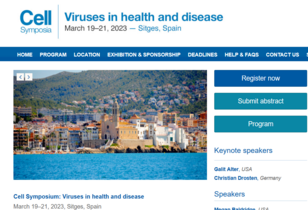
Washington Post
András Spaan (UMCU) is interviewed on the objective of his recent COVID-research, which is a substantial contibution to the UNDINE project. The article addresses the rationale behind the search for rare gentic predispositions and their potential link to the susceptibility to SARS-CoV-2 infections.
The lucky few to never get coronavirus could teach us more about it
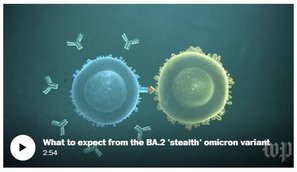
News of the Ministry of Higher Education & Science Denmark
Article about the UNDINE project, including an interview with Trine Mogensen (coordinator). Here the whole article (in Danish only):
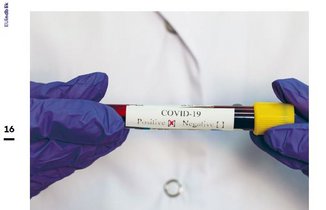
Aarhus University News
